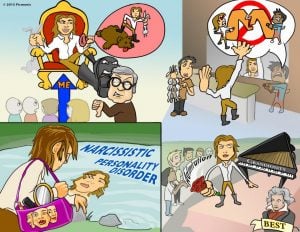Patient will present as → a 45-year-old male lawyer is being worked up for low back pain. He demands that he sees the chief neurosurgeon and won't let any staff in the room. He says he knows "very important people" and that there will be "trouble" if he waits longer than 5 minutes in the waiting room.
To watch this and all of Joe Gilboy PA-C's video lessons you must be a member. Members can log in here or join now.
Key Points
Need for admiration, grandiose thoughts, concerned about what others think yet lack empathy
- Sense of entitlement
- Lacks empathy
- Reacts to criticism with rage
DSM-5 Diagnostic Criteria
A pervasive pattern of grandiosity (in fantasy or behavior), need for admiration, and lack of empathy, beginning by early adulthood and present in a variety of contexts, as indicated by five (or more) of the following:
- Has a grandiose sense of self-importance (e.g., exaggerates achievements and talents, expects to be recognized as superior without commensurate achievements).
- Is preoccupied with fantasies of unlimited success, power, brilliance, beauty, or ideal love.
- Believes that he or she is “special” and unique and can only be understood by, or should associate with, other special or high-status people (or institutions).
- Requires excessive admiration.
- Has a sense of entitlement (i.e., unreasonable expectations of especially favorable treatment or automatic compliance with his or her expectations).
- Is interpersonally exploitative (i.e., takes advantage of others to achieve his or her own ends).
- Lacks empathy: is unwilling to recognize or identify with the feelings and needs of others.
- Is often envious of others or believes that others are envious of him or her.
- Shows arrogant, haughty behaviors or attitudes.
Psychotherapy
- Cognitive, behavioral, psychoanalysis
Pharmacologic
- Avoid medications with an abuse potential
 |
Narcissistic personality disorder can be described as a condition in which people have an excessive sense of self-importance, lack empathy for others, and possess an extreme preoccupation with themselves causing them to seek the admiration of others. Beginning by early adulthood and present in a variety of settings, people with this personality disorder may inflate their accomplishments, get easily angered when criticized, show little interest in others experiences, and require excessive admiration. |
Question 1 |
Preoccupation with order Hint: Preoccupation with order is characteristic of obsessive compulsive personality disorder. | |
Voluntary social withdrawal Hint: Voluntary social withdrawal is characteristic of schizoid personality disorder. | |
Hypersensitivity to rejection Hint: Hypersensitivity to rejection is characteristic of avoidant personality disorder.
| |
Lack of empathy and sense of entitlement | |
Excessive emotionality and excitability Hint: Excessive emotionality and excitability is characteristic of histrionic personality disorder. |
|
List |


 Lecture
Lecture Picmonic
Picmonic